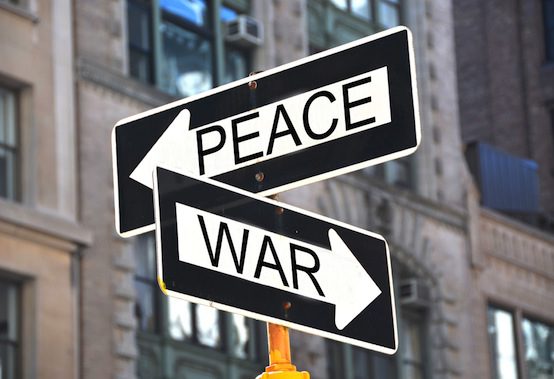Why War Opponents Usually Lose

Andrew Bacevich reviews Michael Kazin’s War Against War. Here is his sobering conclusion:
Today, long gone is any aversion to war that Americans might once have felt. Principled opposition to war has been consigned to the margins of national politics. In the Senate, there is no heir to Robert La Follette. And contemporary equivalents of Jane Addams don’t get invited to the White House to consult on foreign policy.
Against steep odds, Kazin’s protagonists came up short. Today those odds have become steeper still.
Unfortunately, that assessment is correct. A new report out today tells us that U.S. military involvement in multiple countries is increasing “with no end in sight,” but this intensification of our foreign wars isn’t likely to produce much opposition. Even when the U.S. was not used to involving itself in the wars of other nations, pro-war hysteria prevailed. Now we are so accustomed to unending war that there is no need for pro-war hysteria to overwhelm the opposition. New wars have become so common that they are greeted with a shrug or bored acceptance.
Our foreign policy debates have long been biased in favor of action, which almost always means military action in practice. Our collective bar for what our leaders think merits that action has been lowered so much that it is nearly on the ground. Even though the burden of proof should be on the side that advocates starting or escalating wars, that burden is always put on the side that wants the U.S. to stay out. The warped understanding of American “leadership” that supposedly requires us to “act” in response to conflicts that have nothing to do with us is pervasive, and very few people in Congress or elsewhere seem willing to reject it. Almost all of the political incentives are on the side of supporting new wars, and most politicians respond to those incentives accordingly.
War opponents always operate with a number of disadvantages, and one of the most important of these is the lack of sufficient time to organize before the war has already begun. With the notable exception of the backlash against the proposed bombing of Syria in 2013, the U.S. often goes to war so quickly before the issue has been debated that there is never a chance to stop U.S. involvement until after the damage has already been done. In that case, the U.S. would have been at war with the Syrian government without any debate at all if the House of Commons had not recoiled from another unnecessary intervention. The lesson interventionists learned from that episode was that elected representatives should just be bypassed, and so they have been. In several recent instances, the U.S. has simply started or joined a war without authorization from Congress, and there is never an occasion when war opponents might voice their objections.
The biggest disadvantage that American war opponents may have today is that keeping out of other nations’ wars is no longer considered the normal and traditional role for the U.S. as it was a century ago. Americans that have grown up in the last three decades would have almost no memory of a time when the U.S. wasn’t actively engaged in hostilities overseas for most of their lifetimes, and few of us can recall a time when the U.S. was continuously at peace with the rest of the world for more than a decade. The extraordinary thing is that virtually every war that the U.S. has fought over the last century has been one that our government chose to fight when it didn’t have to.
Comments